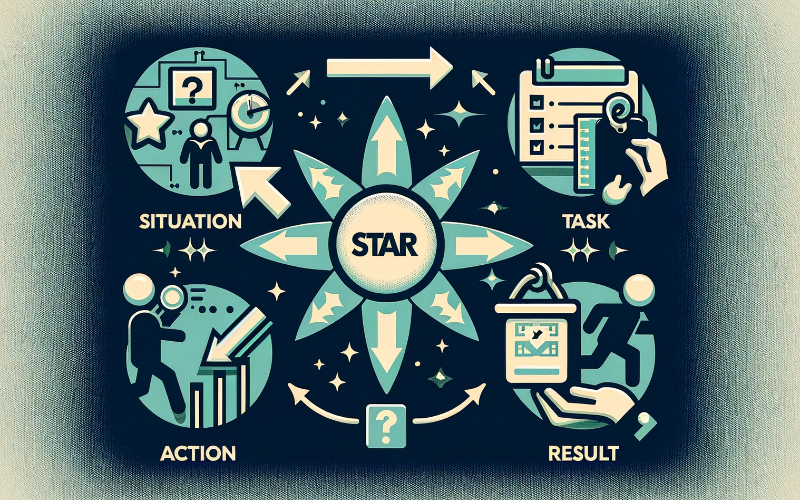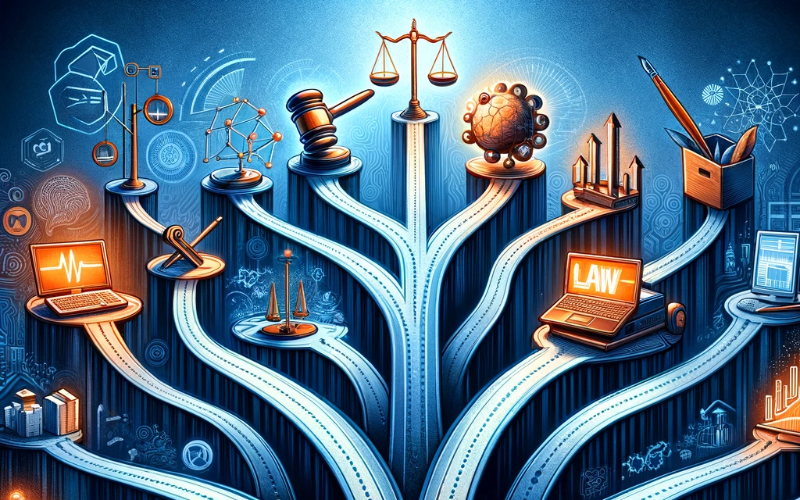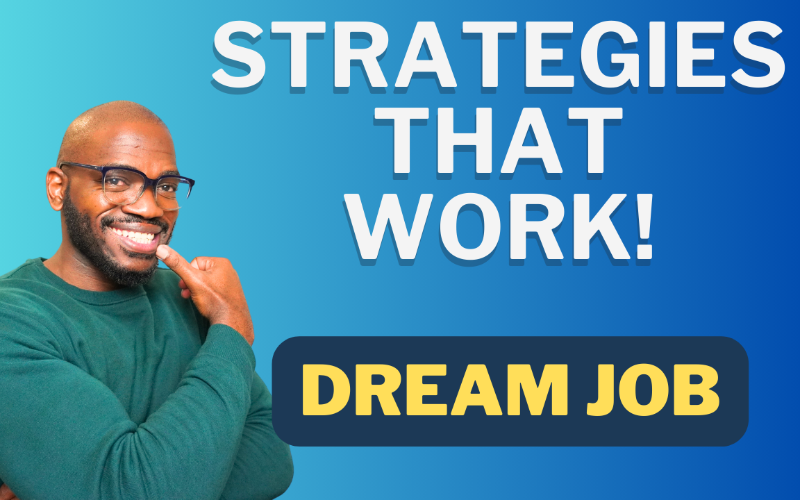In the dynamic world of career advancement, behavioral job interviews have become a cornerstone for employers to gauge the potential of candidates. Unlike traditional interviews focusing on qualifications and technical expertise, behavioral interviews delve into a candidate's past experiences to predict future performance. This comprehensive guide will equip you with the necessary tools and insights to excel in these interviews.
Table of Contents
What are Behavioral Job Interviews?
Behavioral job interviews are a unique approach used by employers to understand how a candidate has handled various work situations in the past. The underlying belief is that past behavior is the best predictor of future performance in similar scenarios. This interview style goes beyond the résumé to explore the candidate's problem-solving, decision-making, and interpersonal skills in real-life situations.
In these interviews, candidates are often asked to describe specific instances where they demonstrated particular skills or faced certain challenges. For instance, an interviewer might ask, "Tell me about a time when you had to work under a tight deadline." The aim is to get a clear picture of how the candidate has applied their skills and knowledge in past experiences and how they might bring value to the new role.
Why Employers Use Behavioral Interviews
Employers prefer behavioral interviews for several reasons:
-
Predictive Accuracy: They provide a more accurate prediction of future performance compared to traditional interviews.
-
Fairness and Objectivity: By focusing on real experiences, they level the playing field, allowing candidates from diverse backgrounds to demonstrate their capabilities.
-
Skill Assessment: These interviews are excellent for assessing soft skills like teamwork, leadership, and adaptability, which are crucial for organizational success.
Employers are not just interested in what candidates have done, but how they have done it. The emphasis is on extracting the candidate's thought process and approach to challenges.
The STAR Method Explained
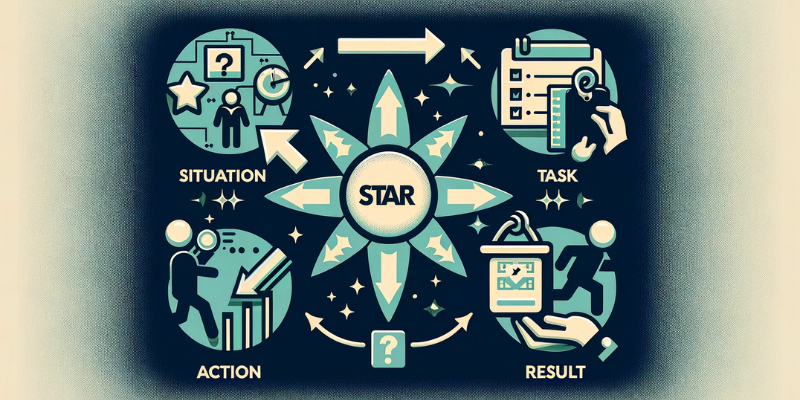
The STAR method is a structured manner of responding to a behavioral-based interview question by discussing the specific situation, task, action, and result of the situation you are describing.
Understanding the STAR Format
Situation: Set the scene and give the necessary details of your example.
Task: Describe what your responsibility was in that situation.
Action: Explain exactly what steps you took to address it.
Result: Share what outcomes your actions achieved.
Employing the STAR method structures your answer and ensures it’s coherent and concise. This method not only helps in conveying your stories in a way that effectively communicates your skills and abilities but also ensures that your answers are succinct and to the point.
Crafting Your Responses Using STAR
-
Be Specific: Choose a specific event or situation that you handled well.
-
Focus on You: Talk about a situation where you were the key player.
-
Highlight Transferable Skills: Even if you’re switching industries, many skills like leadership, teamwork, and problem-solving are transferable.
-
Quantify Your Impact: If possible, quantify the result for a stronger impact. For example, “My action resulted in a 20% reduction in customer complaints.”
Example Using STAR:
Question: Describe a time when you had to deal with a team conflict.
-
Situation: “In my previous role as a project manager, we were close to a deadline, and conflict arose between two team members.”
-
Task: “As the team leader, it was my responsibility to mediate and resolve the issue.”
-
Action: “I organized a meeting to discuss the issues openly and facilitated a discussion where each party could voice their concerns.”
-
Result: “The conflict was resolved, and we successfully met the project deadline. The team also learned valuable communication skills.”
By keeping your responses structured and clear, you can demonstrate your abilities effectively.
Common Behavioral Interview Questions

Behavioral interviews typically revolve around various aspects of work life, such as teamwork, leadership, problem-solving, and work ethic. By understanding these common categories and preparing accordingly, you can approach your interview with confidence.
Categories of Questions
-
Teamwork: Questions about your interaction and effectiveness within a team.
-
Problem-solving: Queries on how you approach and resolve workplace challenges.
-
Leadership: Inquiries into your ability to lead and inspire others.
-
Work Ethic: Probing your dedication, responsibility, and commitment to work.
-
Adaptability: Questions about handling change and adapting to new situations.
Examples of Questions and Ideal Answers
Teamwork:
-
Question: "Describe a time when you had to collaborate with a difficult colleague."
-
Answer: "At my previous job, I was assigned to a project team with a colleague known for being challenging to work with. He often resisted new ideas and was not open to feedback. My task was to collaborate with him on developing a marketing strategy for a new product launch. I scheduled a one-on-one meeting to understand his perspective and concerns. I listened actively to his points, found common ground, and then proposed a combined approach that incorporated his ideas while introducing new strategies. This approach helped in breaking the ice. We successfully collaborated on the project, which was well-received by the management. It also improved the working relationship with my colleague."
Problem-solving:
-
Question: "Tell me about a time when you faced an unexpected challenge at work."
-
Answer: "In my last role, our team was hit with an unexpected departure of a key member just before a critical project deadline. As the assistant project manager, it was my responsibility to ensure the project remained on track. I quickly redistributed the workload among the team, taking on additional responsibilities myself, and arranged for temporary support from another department. Despite the setback, we managed to meet the deadline and deliver a quality project. This experience taught me a lot about adaptability and resourcefulness under pressure."
Leadership:
-
Question: "Give an example of a time when you had to lead a team under pressure."
-
Answer: "During a high-stakes project at my previous job, our team leader unexpectedly fell ill, creating a leadership vacuum. As the most experienced team member, I stepped up to lead the team through the final stages of the project. I organized daily briefings, delegated tasks based on team members' strengths, and set up a more collaborative communication system. The team responded well to my leadership style, and we completed the project two days ahead of schedule, receiving commendation from our clients."
Work Ethic:
-
Question: "Can you provide an instance where your dedication to a project significantly impacted its outcome?"
-
Answer: "At my previous job, I was part of a project that was struggling to meet its key performance indicators (KPIs) halfway through the timeline. As a project analyst, I was tasked with identifying the bottlenecks and implementing solutions. I conducted an in-depth analysis of our processes, identified areas of inefficiency, and proposed a new strategy that optimized our workflow. I also volunteered for extra hours and collaborated closely with team members to implement these changes. The project saw a significant improvement, with a 30% increase in efficiency, meeting all KPIs by the end of the timeline. My dedication not only impacted the project’s outcome positively but also set a new standard for future projects."
Adaptability:
-
Question: "How do you handle rapid changes in the workplace?"
-
Answer: "In my last role, our company underwent a major organizational restructuring, which brought about swift and significant changes in our team’s operation. As a team supervisor, it was crucial for me to adapt quickly and ensure my team remained productive and motivated. I kept a positive attitude, attended all training sessions to understand the new processes, and relayed clear, concise information to my team. I also held regular team meetings to address concerns and provide updates. My proactive approach ensured that my team adapted efficiently to the changes. We were able to maintain our productivity levels, and team morale remained high despite the initial uncertainties."
Understanding the types of questions and preparing structured responses can significantly enhance your performance in a behavioral interview.
Research and Preparation
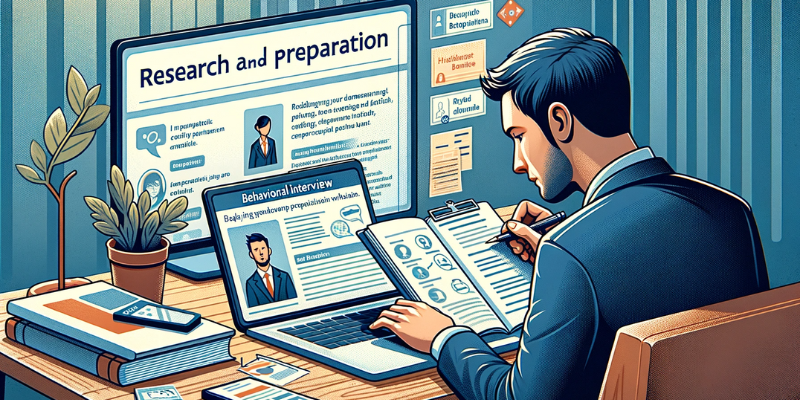
Thorough research and preparation are crucial for succeeding in behavioral job interviews. Understanding the company and the specific role you are applying for can significantly enhance the relevance and impact of your responses.
Company-Specific Preparation
-
Understand the Company Culture: Research the company’s values, mission, and work environment. This knowledge will help you tailor your responses to align with the company's ethos.
-
Review the Company’s Recent Achievements: Being informed about recent successes or challenges the company faced shows your interest and initiative.
-
Know the Industry: Stay updated on current trends and challenges in the industry to demonstrate your awareness and preparedness.
Role-Specific Preparation
-
Job Description Analysis: Carefully analyze the job description to understand the key competencies required.
-
Match Your Skills and Experiences: Identify how your skills and past experiences align with the role's requirements.
-
Prepare Relevant Examples: Have a range of examples that showcase your skills and experiences relevant to the role.
Tips for Effective Preparation:
-
Utilize the company’s website, social media, and recent news articles for research.
-
Practice answering questions related to the job description.
-
Use LinkedIn to understand the background of your interviewers, if possible.
Preparing specifically for the company and role demonstrates your dedication and fit for the position, significantly increasing your chances of success.
Practicing for the Interview
Effective preparation goes beyond understanding the job and the company; it also involves practicing how to articulate your experiences and skills during the interview.
Mock Interviews and Role-Playing
-
Conduct Mock Interviews: Practice with a friend, family member, or mentor. Receiving feedback from someone can provide new perspectives on your responses.
-
Use Recording Tools: Record your practice sessions. Watching yourself can help identify areas for improvement in body language and verbal communication.
-
Role-Playing Different Scenarios: Prepare for a range of questions, including difficult or unexpected ones. This helps build confidence and adaptability.
Self-Reflection on Past Experiences
-
Analyze Your Professional History: Reflect on your past roles and identify key experiences that demonstrate your skills and achievements.
-
Prepare Diverse Examples: Have a variety of examples ready, so you don’t repeat the same story.
-
Relate to the Job Description: Ensure your examples are relevant to the skills and experiences the job requires.
Practice Tips:
-
Try to simulate the interview environment during practice.
-
Focus on clarity and conciseness in your responses.
-
Work on storytelling skills to make your examples more engaging and memorable.
Regular practice using these methods can greatly enhance your performance in behavioral job interviews, making your responses more natural and impactful.
The Day of the Interview
The interview day is crucial, and how you present yourself, both verbally and non-verbally, can make a significant difference. Here are key tips to help you make the best impression.
Presentation and Body Language
-
Dress Appropriately: Choose professional attire that fits the company culture.
-
Positive Body Language: Maintain good eye contact, offer a firm handshake, and sit upright.
-
Facial Expressions: Be mindful of your expressions; they should reflect engagement and confidence.
Handling Nerves and Staying Poised
-
Breathing Techniques: Use deep breathing exercises to calm your nerves.
-
Positive Affirmations: Remind yourself of your preparation and skills.
-
Pause Before Responding: Take a moment to gather your thoughts before answering each question.
On the Day Tips:
-
Arrive early to avoid any last-minute stress.
-
Bring copies of your resume, a list of references, and a notepad and pen.
-
Be courteous to everyone you meet, from the receptionist to the interviewer.
The right preparation and mindset on the day of the interview can significantly enhance your performance and leave a lasting positive impression.
Post-Interview Evaluation
Reflecting on your interview performance is a crucial step in your career development. It helps you identify areas of strength and aspects that need improvement.
Self-Assessment and Feedback
-
Review Your Responses: Reflect on the clarity and effectiveness of your answers.
-
Analyze Your Body Language: Think back to your non-verbal cues and their possible impact.
-
Feedback Request: If possible, politely ask for feedback from your interviewer.
Continuous Improvement
-
Identify Key Learnings: What insights did you gain from the experience?
-
Develop an Action Plan: Based on your learnings, outline steps for improvement.
-
Seek Professional Advice: If needed, consider career coaching or interview workshops for further development.
Post-Interview Tips:
-
Write down your thoughts and observations soon after the interview while they’re fresh.
-
Keep a journal of your interviews to track your progress over time.
-
Use each interview as a learning opportunity, regardless of the outcome.
Evaluating your performance post-interview is a powerful tool for continuous growth and preparation for future opportunities.
Conclusion
This concludes our guide on "How to Prepare for Behavioral Job Interviews." Each step, from understanding the interview format to post-interview evaluation, plays a crucial role in your preparation. Implementing these strategies will help you present your experiences confidently and leave a lasting impression.
Preparing for behavioral job interviews requires a combination of understanding the interview style, practicing with the STAR method, researching the company and role, and reflecting on your performance. With these strategies, you’re well-equipped to showcase your abilities and secure your desired role.
Ready to ace your next behavioral job interview? Start implementing these strategies today. For more insights on career advancement and interview techniques, check out Unlocking Success: Proven Strategies to Ace Your Next Job Interview
